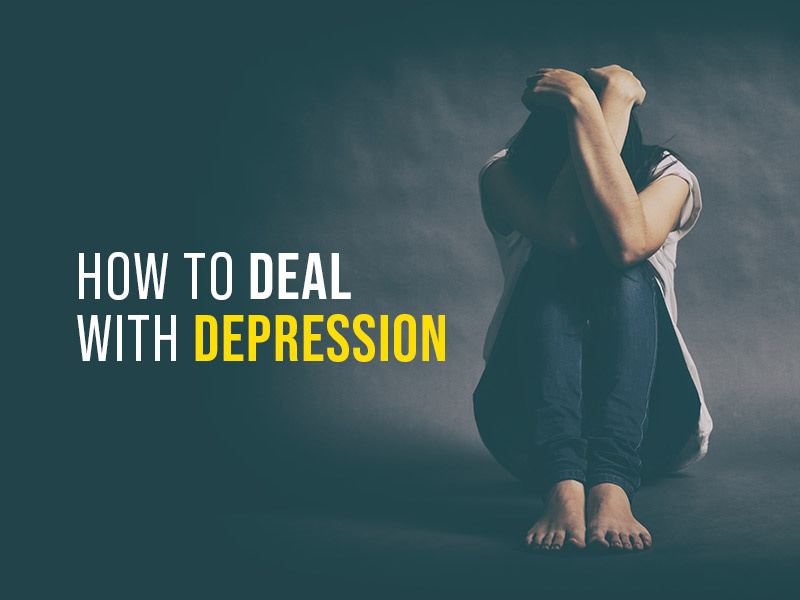How To Deal With Depression | Best 7 Things to Try
Depression saps your energy, hope, and motivation, making it difficult to take the actions necessary to improve your mood. It can be hard or impossible to put into action merely thinking about the things you should do to feel better, such as exercising or spending time with friends.
It’s a Catch-22 situation when it comes to depression recovery: The things that are the most difficult to perform are the ones that help the most. However, there is a significant difference between a tough task and one that is impossible. Even if your depression is severe and persistently persistent, you have more control than you think.
The key is to start small and work your way up. You might not have a lot of energy, but by drawing on all your reserves, you should have enough to take a walk around the block or pick up the phone to call a loved one, for example.
Taking the first step is always the hardest. But going for a walk or getting up and dancing to your favorite music, for example, is something you can do right now. And it can substantially boost your mood and energy for several hours-long enough to put a second recovery step into action, such as preparing a mood-boosting meal or arranging to meet an old friend. By taking the following small but positive steps day by day, you’ll soon lift the heavy fog of depression and find yourself feeling happier, healthier, and more hopeful again.
7 Tips to Help You Deal With Depression
Talk to a Therapist
Working with a therapist is often an important part of successfully managing depression. “Psychotherapy will focus on helping people adjust their lifestyle in ways that are possible, minimize their stress, and cope with stressors,” says Dr. Nelson. Among the issues that you can address together are how to improve your self-esteem, switch from negative to positive thinking, and practice stress management.
Express Yourself in Writing
Writing in a journal is an excellent kind of therapy that can aid in the treatment of depression. Being open about your ideas, feelings, and concerns in your writing can help you release stress, and stress management is a crucial component of living well with depression. In your private journal, be completely honest. Writing out your depression sensations and struggles will help you let go of pent-up emotions. You’ll be surprised at how much better you feel after only a few minutes of writing each day.
Boost Your Self-Image
People who suffer from depression frequently have poor self-esteem, therefore finding techniques to improve your self-esteem is an important part of treatment. Focus your thoughts on your best attributes to practice positive thinking. You can also boost your self-esteem by making lifestyle adjustments such as eating a healthy diet, exercising regularly, and spending time with friends who make you feel good about yourself.
Make a schedule
According to Nelson, maintaining a healthy and regular schedule is extremely beneficial for persons suffering from depression. He notes that “many times with depression, people’s motivation declines,” making them feel unproductive and fostering low self-esteem. Schedule a daily activity that you must complete — make it one that you truly enjoy — and strive for as much balance in your life as possible.
Stay involved
If you’re experiencing depression, you may feel like you want to withdraw socially and keep to yourself, either because of low self-esteem or a lack of interest. “Social life is important,” says Nelson. Push yourself to stay involved with your friends. Social connections can help keep you from spiraling downward into deeper depression and from becoming isolated and alone with your thoughts. Go to the movies, share a brisk walk, or just catch up with a close friend — it might lift your spirits.
Spend time with others
Friends and family can help you feel better about yourself when depression brings you down. Allow yourself to lean on loved ones when you need them. They can encourage you to follow your treatment plan, exercise, eat a healthy diet, and generally take care of yourself — all steps necessary to get better. You can also join a support group for people with depression for the chance to talk to others who understand what you’re going through.
Sleep well
Getting plenty of rest every night is a must for your mood. People with depression often have noticeable sleep disturbances — they either sleep too much or not enough. Go to bed and wake up on a regular schedule, and never skimp on your ZZZs. Feeling run-down will exacerbate your symptoms of depression and make it more difficult to be social, get exercise, and manage stress.
Conclusion
Even if you don’t take medication, you can find strategies to take charge of your life and manage your therapy when you have depression. Making simple lifestyle modifications can help you feel better and reduce a variety of problems, including low self-esteem. “When you’re sad, it’s a good idea to minimize stress as much as possible,” Erik Nelson, MD, a psychiatrist and assistant professor of clinical psychiatry at the University of Cincinnati College of Medicine in Ohio, says.
Also Read:
















